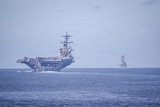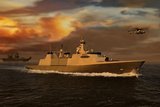Naval Group launches third Argentinian OPV
The third of the four Offshore Patrol Vessel 87 (OPV 87) ordered to Naval Group by Argentina has been launched at Concarneau shipyard (Brittany). (Photo: Naval Group)
Naval Group launched ARA Storni on 10 May as the third of four Argentinian OPV 87 vessels.
The delivery is part of the contract between Naval Group and Argentina to provide four multi-mission offshore patrol vessels (OPVs). ARA Bouchard was delivered in December 2019 and ARA Piedrabuena followed in April 2021.
ARA Storni will offer the same assets and characteristics as the ARA Piedrabuena. It is better armed than the ARA Bouchard, more motorised, equipped with an active stabilisation system, bow thruster and is adapted to cold-water navigation, such as around Antarctica.
The Argentinian OPVs benefit from innovations developed by Naval Group and proven by the French Navy.
It features high endurance and seaworthiness, 360˚ visibility from the bridge, a unique mast for a panoramic radar coverage and a ramp system at the bow for rapid deployment of fast crafts or SF.
The ARA Storni is equipped with the Polaris system and NiDL tactical data link.
The vessel can stay in deep-sea environments for more than three weeks. It can reach a speed of 20kt and has a reduced crew size of 40 people.
The vessel has space on board for a helicopter and around 20 additional passengers.
Related Equipment in Defence Insight
More from Naval Warfare
-
![UK’s Fleet Solid Support ship programme deemed on track despite steel supply concerns]()
UK’s Fleet Solid Support ship programme deemed on track despite steel supply concerns
Shipbuilders are saying the programme is going ahead on time as the government estimates 7.7 million tonnes of steel are needed for 2026 infrastructure projects.
-
![As Indonesia doubles up its order, who else is looking at the Arrowhead 140 frigate design?]()
As Indonesia doubles up its order, who else is looking at the Arrowhead 140 frigate design?
The adaptable design of Babcock’s Arrowhead 140 frigate, already selected by the UK Royal Navy and Poland, has led to more orders from Indonesia while other countries continue to weigh it up.
-
![US Navy to invest more than $700 million in laser-related R&D efforts in FY2026]()
US Navy to invest more than $700 million in laser-related R&D efforts in FY2026
The US Navy’s acceleration of its laser weapon development initiatives reflects a decisive shift towards ultimately having a “laser on every ship” across tomorrow’s surface fleet.





















